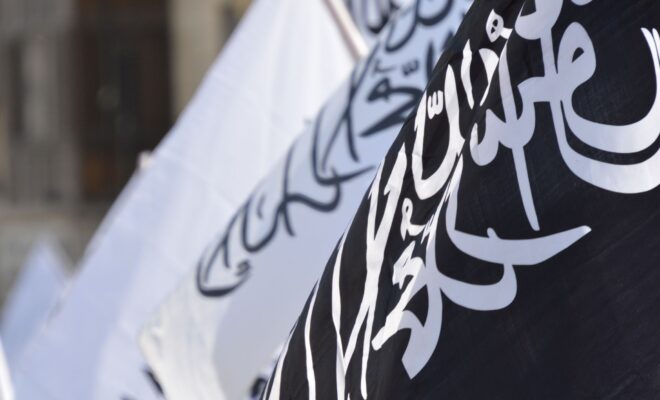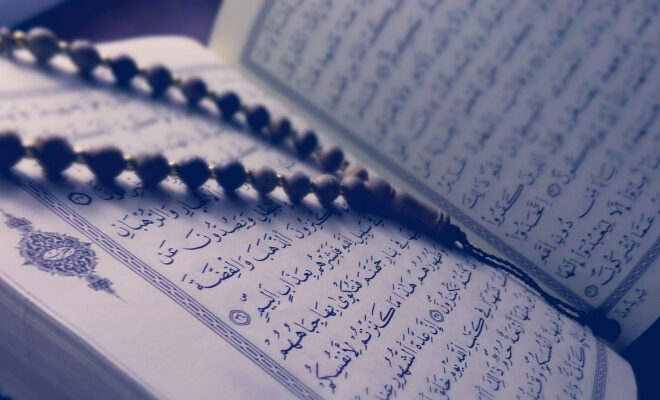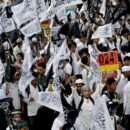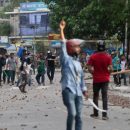Why We Must Reflect on Rajab

In the month of Rajab, Rasul’Allah (saw) journeyed from Masjid al-Haram to Masjid al-Aqsa. By Allah’s (swt) will, Rasul’Allah (saw) then ascended to the heavens and met with the past prophets. Finally, he (saw) spoke with Allah (swt). This event is known as the Isra’-wal-‘Mi’raj.
When Rasul’Allah (saw) returned to the world, he (saw) had brought Allah’s (swt) promise of victory to the Muslims and the final verses of Surah al-Baqarah, including:
“So grant us victory over the disbelieving people.” [TMQ 2:286]
Since the events of Isra’-wal’Mi’raj, Rajab became a month of triumph, tests, and tragedy for our Ummah.
The triumph of this month was the second pledge of al-Aqabah, i.e., where key people of Aws and Khazraj from Madinah vowed to guard and support Rasul’Allah (saw).
This pledge led to the formation of the first Islamic State in Madinah, which was the starting point of our Ummah’s status as a real force in the Arabian Peninsula. After a generation, the Ummah became a leading force in the whole world.
The test of this month was the Campaign of Tabuk. The Sahaba (ra) had marched in the scorching desert heat to thwart an invasion by the Roman-Byzantine Empire. Upon hearing of the Muslims approaching with a strong army, the Roman-Byzantines fled from the border between Shaam (present-day Syria, Palestine, Jordan, and Lebanon) and the Arabian Peninsula.
And finally, the tragedy of this month was the destruction of the Khilafah, the shield Rasul’Allah (saw) forged in Madinah to protect the Muslims and to spread Islam to the world.
Nonetheless, Rajab is not just a month of historical events, but also an important period where we must deeply reflect upon our situation as individuals as well as an Ummah.
Our Ummah is in Crisis
Just look around. Our lands suffer from broken economies, wide-spread corruption, and divisions. Our sisters in Islam suffer from harassment and attacks in both distant lands like India and “at home” in Canada, most severely in Quebec. Our children are targets for poisonous liberal concepts about gender, relationships, and other issues.
Overall, wherever we go, we cannot find a land that will embrace us for who we are – i.e., Muslims.
Why are we in this crisis? What can we do to get out of it?
Lessons of Isra’wal-Mi’raj
Isra’-wal-‘Mi’raj is a lesson of many levels.
Firstly, it is a lesson showing us that we are in this world to obey Allah (swt) and nothing else. Allah (swt) said:
“I did not create the Jinns and the human beings except for the purpose that they should worship Me.” [TMQ 51:56]
Rasul’Allah (saw) called the Arabs to obey Allah (swt) in every matter. As a result, he (saw) and the Sahaba (ra) suffered from Quraysh’s violence, slander, and oppression.
Secondly, Isra’-wal-Mi’raj is a lesson where we stand for all aspects of Islam. We call people to all of Islam, even if they hate or mock our message. When the people doubted and mocked Rasul’Allah (saw) for explaining the events of Isra’-wal-Mi’raj, Abu Bakr said, “If he (the Prophet) said that, then he Is speaking the truth.”
Thirdly, this event is a lesson for us to have faith in the eventual victory of Allah (swt). No matter how bleak our situation gets, we must hold onto our deen. We must strive to implement it and, be it in this life or the Hereafter, Allah (swt) will reward us.
Khilafah: The Solution to Our Crisis
The Khilafah is the system through which Allah (swt) commanded us to implement His laws on Earth. It carries specific social, governing, economic, legal, and other rules which we must apply on society at large. Rasul’Allah (saw) started this system in Madinah. Then after him (saw), the Sahaba (ra) spread Islam – and the Khilafah – across Africa and most of Asia. And, for over 1,300 years, the Ummah rallied under this system.
Basically, the Khilafah was the backbone of our Ummah, but only until traitors among us tore it out. Since that day – i.e., the 28th of Rajab 1342 AH (March 3rd, 1924, CE) – the Ummah endured almost a century of slaughter, theft, and oppression at the hands of the Colonialist powers and their tools in the Muslim lands.
However, the oppression and other problems in themselves are not the root issues troubling our Ummah. In its history, the Ummah always faced such challenges. In fact, Palestine was occupied by the Crusaders for about 200 years. Yet, in the end, the Ummah defeated and drove the Crusaders out.
How? By fighting under the banner of Islam and with leaders like Salahuddin (rrh) and Baibars (rrh). As a matter of fact, Salahuddin (rrh) liberated al-Quds in Rajab!
The Ummah has the ability to come back from hardship, no matter how bad that hardship is. But the Ummah is only able to do so under the banner of the Shahadah and the system of the Khalifah State.
The Khilafah is an Urgent Duty
The root issue is that we are not implementing Islam. Allah (swt) made the Khilafah a necessary pillar of applying Islam.
This was the only way through which Rasul’Allah (saw) had implemented this deen on Earth the first time. According to Islamic evidence, it is not acceptable to apply the deen in any other way. We cannot neglect the work of re-establishing Islam through the Khilafah. For Rasul’Allah (saw), establishing the Islamic way of life was as heavy an issue as life and death.
He (saw) said:
“O my uncle, by Allah, if they put the sun in my right hand and the moon in my left on condition that I abandon this cause, before Allah has made it victorious, or I perish therein, I would not abandon it.” [Ibn Ishaaq]
Furthermore, Rasul’Allah (saw) told the believers that they cannot sit idly by when their societies (i.e.,the Muslim lands) are ruled by flagrant Kufr. “Flagrant kufr” occurs when the laws and systems are not from Islam.
‘Ubaadah ibn as-Saamit narrated:
“The Prophet (saw) called us, so we gave him a pledge to listen and obey in our activity, and our dislike, in our hardship, and our ease and in the things which are dear to us, and not to dispute the authority with its people unless one sees clear Kufr upon which one has proof from Allah.” [Bukhari]
Rasul’Allah (saw) was not referring to the personal failings or sins of rulers. He (saw) was talking about systems, laws, policies, and other mechanisms of running society.
For example, in today’s context, the Saudi regime gave Pakistan a loan loaded with an interest rate of 4% (Reuters). This is a policy of Kufr. Not only does it involve riba (which Allah (swt) outlawed for us), but it does so on wealth belonging to the Ummah. The Saudi regime does not own this wealth. Rather, Muslims in Pakistan – along with all other Muslims – have more right to this wealth than these rulers who rule by Kufr.
This is only one example among countless that span across the last 100 years. But it is these cuts that are bleeding our Ummah in both this life and the Hereafter. Given this situation, can we take the lack of Khilafah in the Muslim lands lightly? Well, based on how Rasul’Allah (saw) acted when the world last lacked the Khilafah, the answer is an absolute no!
In fact, the lack of the Khilafah could hurt us on the Day of Judgement. Rasul’Allah (saw) said:
“Whoever removes his hand from obedience will meet Allah with no proof for himself, and whoever dies without the pledge of allegiance upon his neck dies a death of Jahiliyya.” (Muslim)
Not having a pledge (ba’yah) to a Khalifah could weigh us down on the Day of Judgement. Each one of us could leave this world at any time. Only Allah (swt) truly knows when we will return to Him. The Day of Judgement is coming for all of us. Let us dedicate our remaining time to restoring Islam.
The Victory is Close
Finally, while the situation in the Muslim lands may appear desperate, one key lesson of ‘Isra-wal-Mi’raj is tawakul, or to trust in Allah (swt).
Allah (swt) promised victory to the believers on the condition that they obey Him (swt). His (swt) support is always there for His obedient slaves. If we do not see His (swt) victory in our lives, Allah (swt) will certainly deliver it to us on the Day of Judgement as rewards for our Islamic struggle in the dunya.
However, the victory for this Ummah in dunya is only coming closer. With each passing day, it comes closer to us. There is nothing the Colonialist powers like America and Britain – or their puppet regimes in our lands – can do to stop it.
“There will be Prophethood for as long as Allah wills it to be, then He will remove it when He wills, then there will be Khilafah on the Prophetic method and it will be for as long as Allah wills, then He will remove it when He wills, then there will be biting Kingship for as long as Allah Wills, then He will remove it when He wills, then there will be oppressive kingship for as long as Allah wills, then he will remove it when He wills, and then there will be Khilafah upon the Prophetic method” and then he remained silent.” [Ahmed]
Engage With Us
To learn more about the Khilafah and the Islamic obligation (fard) to restore it, we invite you to check out our free literature at hizb-canada.org/resources.









